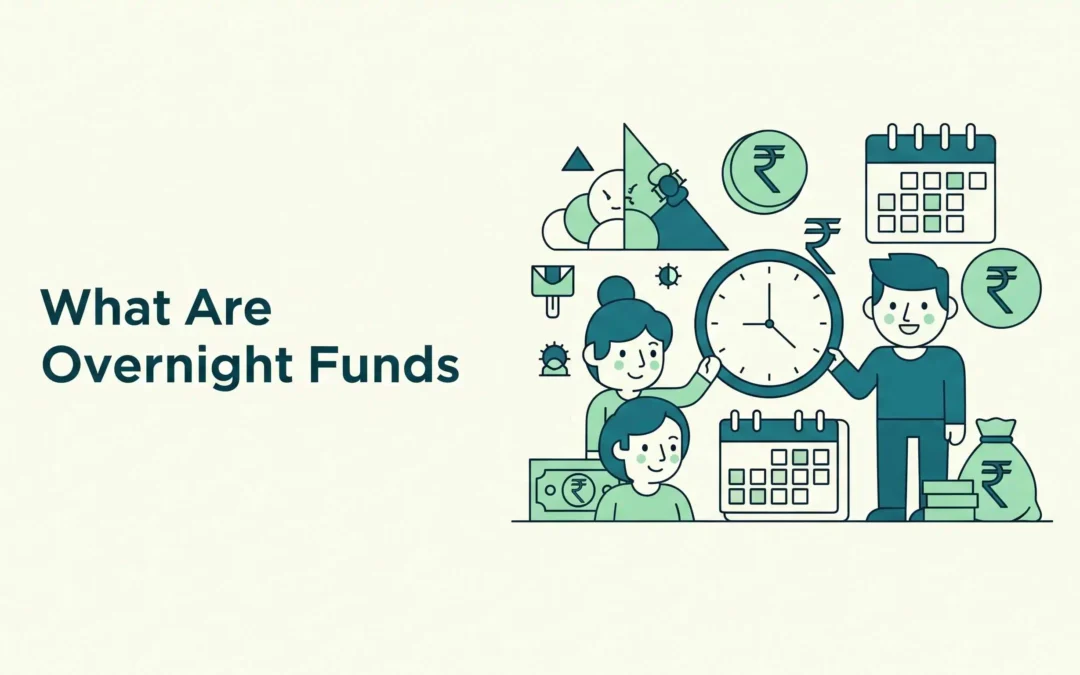Investors may feel that short-term securities are not a safe investment option. Investors looking for low-risk, short-term investment options have recently become more interested in overnight funds. People with a conservative nature and extra cash may want to invest in this fund without worrying much about risk. It provides the perfect balance of safety, liquidity, and affordable returns. But are these funds really that safe? Is it the right investment choice? Do they have any drawbacks?
Let us understand overnight funds in detail, from their meaning to the investors most suitable for them and the cons associated with them.
What Are Overnight Funds?
Overnight funds are a type of debt mutual funds that have investments in securities with a maturity of just one day. As it operates on a debt mechanism, the fund lends money to borrowers for one day by investing in short-term debt instruments, and earns interest in return. Overnight funds are designed in a way to provide high liquidity, low risk, and stable short-term returns.
Below are some of the examples of overnight funds:
| Fund Name | Returns for Regular growth | Expense Ratio | Asset Under Management (₹ Cr) | Credit Rating | Exit Load |
| SBI Overnight Fund | 6.4% | 0.14% | 15182.12 | Sovereign/AAA | Nil |
| ICICI Prudential Overnight Fund | 6.49% | 0.16% | 9,430.97 | Sovereign/AAA | Nil |
| HDFC Overnight Fund | 6.43% | 0.17% | 10148.53 | Sovereign/AAA | Nil |
| Axis Overnight Fund | 6.48% | 0.09% | 8725.89 | Sovereign/AAA | Nil |
| Nippon India Overnight Fund | 6.43% | 0.16% | 5781.16 | Sovereign/AAA | Nil |
Are Overnight Funds Considered Safe?
Let us look at certain points to understand the safety aspect of overnight funds.
1. Extremely Short Maturity Lowers Risk
Both interest rate risk and duration risk are essentially eliminated:
- Interest Rate Risk: Bond prices are typically impacted by changes in interest rates. However, since the securities in overnight funds mature in a day, the impact is minimal.
- Duration Risk: Bonds with longer maturities are more prone to changes in the market. This risk is removed with a one-day investment horizon.
2. They Carry Minimal Risk
In a one-day lending cycle, the likelihood of a borrower defaulting is almost zero. Usually, overnight money is invested in:
- T-bills, or Treasury Bills
- G-Secs, or government securities
- Tri-party repos (TREPS)
- Reverse Repos
3. Absence of Credit Events
Overnight funds totally avoid the risk of credit downgrades or defaults because they don’t lend to corporate entities for longer periods of time. For instance, numerous debt mutual funds were impacted by the IL&FS default in 2018. Since overnight funds don’t hold long-duration or low-rated corporate debt, they were unaffected.
4. Strict SEBI Rules
The SEBI Mutual Fund Regulations, which oversee overnight funds, guarantee:
- Investing solely in securities with a one-day maturity
- Strict standards for credit quality
- Complete disclosure of the portfolio
- There is no exit load in most cases.
Cons of Overnight Funds
- Low Returns: Typically offer around 6–6.5% annual returns (as of 2024–2025), which are moderate but may still lag behind inflation over the long term.
- Unsuitable for Long-Term Objectives: They are ineffective for generating wealth because they do not offer compounding benefits.
- Taxable Returns: Gains are subject to individual slab taxation (STCG for less than three years), which lowers post-tax yield.
- Opportunity Cost: Money held in overnight schemes might lose out on longer-term debt or equity funds that offer higher returns
- Interest Rate Insensitivity: Environments with rising interest rates do not substantially boost returns.
- Limited Growth Potential: Because NAV grows slowly, aggressive investors find it less appealing.
Who Should Invest in Overnight Funds?
1. Investors with Extra Cash
Many people frequently find themselves with short-term excess money; overnight funds are a good investment option that offers quick access to money along with safe, moderate returns.
2. Business owners and corporate treasuries
Overnight funds are used as a daily cash parking facility by businesses, particularly those with significant cash flows. Businesses can invest in overnight funds to generate modest but steady returns without taking on any capital risk.
3. Conservative investors and senior citizens
Overnight funds can be used as a short-term solution for liquidity needs by people who value capital preservation over return maximisation, such as retirees.
4. Tactical Allocation by Investors
To rebalance a portfolio, these funds are strategically important. They can serve as a secure holding area for investors who are waiting for market corrections before moving into stocks or changing debt instruments.
5. High Liquidity Seekers and Regular Traders
These funds are advantageous to traders or active investors who require instant liquidity and no lock-in for their money in between trades.
Who Should Avoid Overnight Funds?
- Long-term investors looking to increase their capital should consider hybrid or equity funds.
- Higher risk-tolerant investors hoping for above-average returns
- Those seeking returns that beat inflation
Bottomline
The conclusion can be drawn that there is a category of investors that may benefit from overnight funds, but it may not be suitable for all. Overnight funds are highly liquid, but they offer comparatively less return than long-term investment options. They are exposed to less risk, making it a good choice for very conservative investors. But it also takes away the opportunity of investing the same money in long-term options that manage risk and return in the long run.
Investors should analyse the cash they have, the liquidity they require and the risk they can bear before deciding.
Written by: Tanya Kumari


